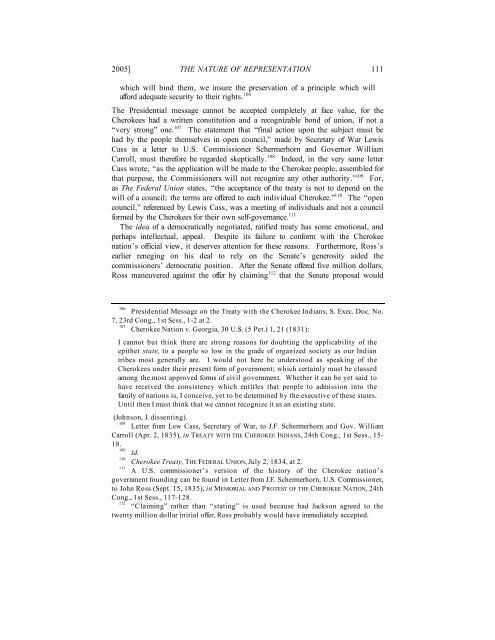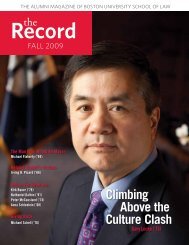the nature of representation: the cherokee right ... - Boston University
the nature of representation: the cherokee right ... - Boston University
the nature of representation: the cherokee right ... - Boston University
Create successful ePaper yourself
Turn your PDF publications into a flip-book with our unique Google optimized e-Paper software.
2005] THE NATURE OF REPRESENTATION 111<br />
which will bind <strong>the</strong>m, we insure <strong>the</strong> preservation <strong>of</strong> a principle which will<br />
afford adequate security to <strong>the</strong>ir <strong>right</strong>s. 106<br />
The Presidential message cannot be accepted completely at face value, for <strong>the</strong><br />
Cherokees had a written constitution and a recognizable bond <strong>of</strong> union, if not a<br />
“very strong” one. 107 The statement that “final action upon <strong>the</strong> subject must be<br />
had by <strong>the</strong> people <strong>the</strong>mselves in open council,” made by Secretary <strong>of</strong> War Lewis<br />
Cass in a letter to U.S. Commissioner Schermerhorn and Governor William<br />
Carroll, must <strong>the</strong>refore be regarded skeptically. 108<br />
Indeed, in <strong>the</strong> very same letter<br />
Cass wrote, “as <strong>the</strong> application will be made to <strong>the</strong> Cherokee people, assembled for<br />
that purpose, <strong>the</strong> Commissioners will not recognize any o<strong>the</strong>r authority.” 109 For,<br />
as The Federal Union states, “<strong>the</strong> acceptance <strong>of</strong> <strong>the</strong> treaty is not to depend on <strong>the</strong><br />
will <strong>of</strong> a council; <strong>the</strong> terms are <strong>of</strong>fered to each individual Cherokee.” 110 The “open<br />
council,” referenced by Lewis Cass, was a meeting <strong>of</strong> individuals and not a council<br />
formed by <strong>the</strong> Cherokees for <strong>the</strong>ir own self-governance. 111<br />
The idea <strong>of</strong> a democratically negotiated, ratified treaty has some emotional, and<br />
perhaps intellectual, appeal. Despite its failure to conform with <strong>the</strong> Cherokee<br />
nation’s <strong>of</strong>ficial view, it deserves attention for <strong>the</strong>se reasons. Fur<strong>the</strong>rmore, Ross’s<br />
earlier reneging on his deal to rely on <strong>the</strong> Senate’s generosity aided <strong>the</strong><br />
commissioners’ democratic position. After <strong>the</strong> Senate <strong>of</strong>fered five million dollars,<br />
Ross maneuvered against <strong>the</strong> <strong>of</strong>fer by claiming 112 that <strong>the</strong> Senate proposal would<br />
106<br />
Presidential Message on <strong>the</strong> Treaty with <strong>the</strong> Cherokee Indians, S. Exec. Doc. No.<br />
7, 23rd Cong., 1st Sess., 1-2 at 2.<br />
107<br />
Cherokee Nation v. Georgia, 30 U.S. (5 Pet.) 1, 21 (1831):<br />
I cannot but think <strong>the</strong>re are strong reasons for doubting <strong>the</strong> applicability <strong>of</strong> <strong>the</strong><br />
epi<strong>the</strong>t state, to a people so low in <strong>the</strong> grade <strong>of</strong> organized society as our Indian<br />
tribes most generally are. I would not here be understood as speaking <strong>of</strong> <strong>the</strong><br />
Cherokees under <strong>the</strong>ir present form <strong>of</strong> government; which certainly must be classed<br />
among <strong>the</strong> most approved forms <strong>of</strong> civil government. Whe<strong>the</strong>r it can be yet said to<br />
have received <strong>the</strong> consistency which entitles that people to admission into <strong>the</strong><br />
family <strong>of</strong> nations is, I conceive, yet to be determined by <strong>the</strong> executive <strong>of</strong> <strong>the</strong>se states.<br />
Until <strong>the</strong>n I must think that we cannot recognize it as an existing state.<br />
(Johnson, J. dissenting).<br />
108 Letter from Lew Cass, Secretary <strong>of</strong> War, to J.F. Schermerhorn and Gov. William<br />
Carroll (Apr. 2, 1835), in TREATY WITH THE CHEROKEE INDIANS, 24th Cong., 1st Sess., 15-<br />
18. 109<br />
Id.<br />
110 Cherokee Treaty, THE FEDERAL UNION,July 2, 1834, at 2.<br />
111 A U.S. commissioner’s version <strong>of</strong> <strong>the</strong> history <strong>of</strong> <strong>the</strong> Cherokee nation’s<br />
government founding can be found in Letter from J.F. Schermerhorn, U.S. Commissioner,<br />
to John Ross (Sept. 15, 1835), in MEMORIAL AND PROTEST OF THE CHEROKEE NATION,24th<br />
Cong., 1st Sess., 117-128.<br />
112 “Claiming” ra<strong>the</strong>r than “stating” is used because had Jackson agreed to <strong>the</strong><br />
twenty million dollar initial <strong>of</strong>fer, Ross probably would have immediately accepted.









